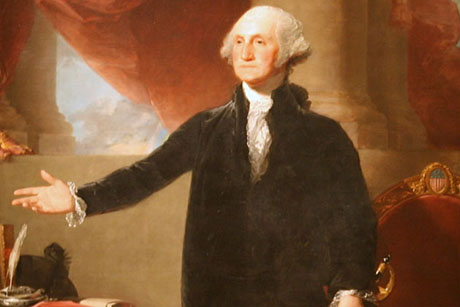For most holidays, the meaning is pretty straightforward. On the Fourth of July, the nation celebrates the 1776 signing of the Declaration of Independence. On Memorial Day we remember the military men and women who died in active service. Presidents Day is a little more ambiguous—and that’s not even its real name.
The U.S. government recognizes today as George Washington’s birthday.
“George Washington was the first president of the United States,” the official description reads. “The observance of George Washington’s Birthday is the third Monday in February. Many Americans refer to the holiday as Presidents’ Day as a way of honoring all past presidents. Contrary to popular belief, neither Congress nor any president has ever officially changed the name of the holiday to ‘Presidents’ Day.’”
And no one’s in agreement whether to use an apostrophe there either.
Though originally created to recognize the birthday of our nation’s first president, the holiday has become yet another three-day weekend in 1971 with the passage of the Uniform Monday Holiday Act, which created more extended weekends for workers. It’s since become marketing fodder for companies trying to shill mattresses and cars and whatever else to get people to spend money on their day off.
Locally, most city, county and other government offices are closed, all mail delivery is taking a day off and the banks have shut their doors until Tuesday. There’s no City Council meeting tomorrow, as San Jose officials almost always cancel the meetings that fall right after a Monday holiday.
Regardless of what you call today, it’s generally regarded as a time for patriotic celebration and reflection. TIME Magazine posted an article on some presidents’ views of their predecessors. The Bio Channel looks at life at times of the first U.S. president. And the International Business Times pulled together a fine collection of presidential quotes.


On this “President’s Day” of 2014, I thank our Presidents for their service and cherish the inalienable right we have as citizens, “to boot the bastards out of office” if they “piss-us-off.”
Jenn W, you report,
“There’s no City Council meeting tomorrow, as San Jose officials almost always cancel the meetings that fall right after a Monday holiday.”
Most San José Voters are unaware City Council members have “institutionalized” giving themselves an additional “day-off” following every Holiday instead of showing up for work. This is in conjunction with the two (2) paid-vacation months of July and December.
Yet, the very same individuals cry “foul” to “city employee-bargained for vested rights” as the direct and proximate cause of the city’s dire financial predicament. A dire financial predicament to wit they all have materially participated to our cumulative detriment.
I think it is pretty neat trick by Council to “invent and implement” at their whim, their own version of “vested rights.” However, methinks this “innovation” is not on par with “Moving at the Speed of Business,” a dry and boring diatribe espoused by Mayor Reed and Council.
The only difference between “city employee-bargained for vested rights” and “City Council’s by whim and implementation-vested rights” is the tax-payers did not confer the formula of “vested rights by trickery.” Hence the resolving of problems that are constantly plaguing the city now are “institutionally deferred” to another time instead of the present.
This brings to mind the number of current Council members who are now running for the position of Mayor and their respective pontifications of worthiness to continue to serve.
Citizens should exercise their own conscience and if consideration dictates, “boot the bastards and or bastardettes out of office” if they have “pissed-you-off.”
“Bootery,” as applied, “to specific Council member’s political buttocks,” will result in a very much improved, City of San José.
David S. Wall
“‘George Washington was the first president of the United States,’ the official description reads.”
.
As an interesting historical footnote, Washington was the first president under the present US Constitution, but there was a first US Constitution throughout the 1780’s that was elbowed aside by the secretive Philadelphia convention, and it had at least six one-year-term presidents with the title of President of the United States of America well in advance of Washington’s presidency.
.
The Continental Congress authorized the Philadelphia convention to consider remedies to the first US Constitution but, in a manner reminiscent of a coup, that convention secretly drafted a new document altogether.
.
Very few people know about the first US Constitution and there seems to be some political alarm when it is mentioned even though it was a relatively untainted document representing a broad range of views held by the soldiers of the war to end monarchy or, in other words, to end one-person rule, dressed up as a contest for independence.
The first United States President was actually Samuel Huntington of Connecticut (1779-1781). But since he held that office prior to the Constitution of 1789, he has been largely excluded from historical accounts (as Mr. Warner alludes to above).